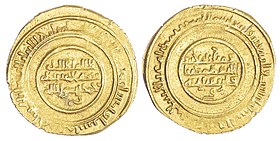Al-Mu'izz ibn Badis
This article needs additional citations for verification. (December 2009) |

Al-Muʿizz ibn Bādīs (
Name
Political career
According to Ibn Khallikan, al-Mu'izz ibn Badis was born at al-Mansuriya on 19 January 1008 (7 Jumada al-Awwal, 398 AH).[2]
Al-Muizz ascended the throne as a minor following the death of his father
Al-Muizz took over the government in 1022 following the overthrow of his aunt. The relationship with the
The political turmoil notwithstanding, the general economic wellbeing initially made possible an extensive building programme. However, the kingdom found itself in economic crisis in the 1040s, reflected in currency devaluation, epidemic and famine. This may have been related to the high level of tribute which the Zirids were compelled to pay annually to the Fatimids (one million gold dinars a year).
When al-Muizz (under the influence of
The Fatimids then sent a military campaign composed of
According to Ibn Khallikan, al-Mu'izz died on 13 August 1062 (4
Literary career
He is usually thought to be
References
- ISBN 978-9973-807-04-5. Retrieved 2024-07-31.
- ^ a b c d e Ibn Khallikan. Guillaume Baron Mac-Guckin de Slane (ed.). Deaths of Eminent Men and the Sons of the Epoch (Vol. III). pp. 386–8. Retrieved 12 April 2022.
- ISBN 9780852550939.
- ISBN 9781107023055.
- ISBN 9781134259939.
- ISBN 9780521414111.
- ISBN 978-0-7486-4077-5.
- JSTOR 1005932.
- ^ "MuslimHeritage.com - Topics". www.muslimheritage.com. Archived from the original on 2002-12-17.
- ^ "Technology Transfer in the Chemical Industries". Archived from the original on 2008-03-09. Retrieved 2008-03-29.
- OCLC 495469525.
